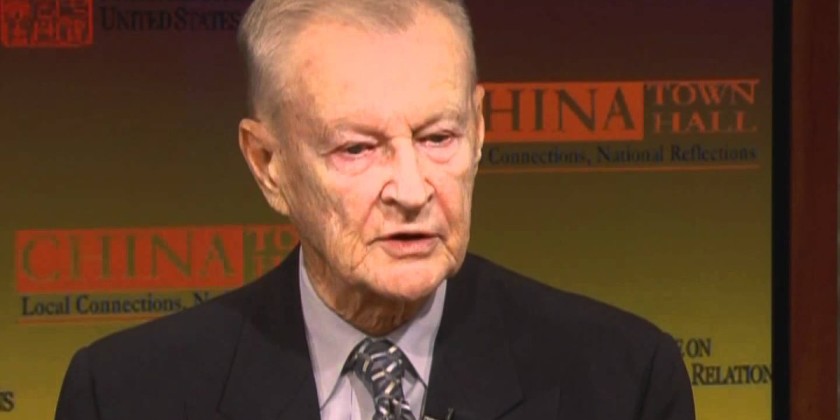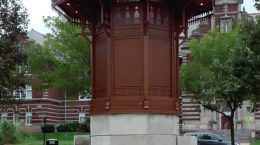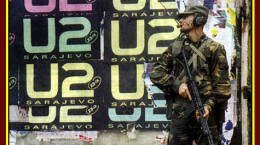After the fall of the Soviet Union what was left is a naked fascism for which communism was more pretext than guiding ideology. Post Soviet Russia may have had a flirting affair with democracy. However, soon the apparatus of the old Soviet state was regenerated in the service of Putin’s Russia. In the early 1990’s Putin was still in the shadows, but the model was already being forged by Slobodan Milosevic. He and allies sought to mobilize the military, political, cultural and economic resources of the “soft communism” of a multi-ethnic Yugoslavia into a mono-nationalist force to maintain absolute power in the service of a presumed “Greater Serbia.” It did not really matter that Milosevic may not have been even a true-believer in Serb nationalism. He was perhaps the first to employ populism in post WWII or certainly post-Communist Europe. Since, the same alchemy of false promises has been adopted by politicians that are loosely defined as populist to far-right, Donald Trump to Marine LePen to Vladimir Putin.
Communism as Pretext for Fascism:
“Zbig” Brzezinski invited me to lunch as the wars of former Yugoslavia were directed toward their most vulnerable victim, Bosnia & Herzegovina. As a trusted adviser to several Presidents and holding the most important diplomatic/security posts in the Carter Administration, Zbig had developed a media reputation as tough on Communism. He was a trusted Democrat who spoke as a Republican when it came to the “Evil Empire.” In 1992, one might have expected Zbig to take a “victory lap” with the fall of the Berlin Wall along with the Soviet Union but he already sensed the new challenge. The Soviet Union was not so much about communism; that was the veneer. It was the pretext for expansion, domination and autocracy. Liberal democracy was the enemy and true target. Milosevic was the test case for how communist apparatchiks would be reborn as fascist leaders seeking to reassert autocracy in the cause of nationalism. No doubt Zbig foresaw Putin, even if the specific name and face were still unrecognized. The more opportunistic already were scavenging within and beyond Soviet borders. Chaos provided cover for a new class of looters transitioning to oligarchs while the real power grab was underway at the Kremlin. A new generation of diplomats who might have been the voice for a progressive Russia instead became apologists for Milosevic’s expansionism. This is how I got to know then Russia UN Ambassador Sergei Lavrov and Ambassador Vitaly Churkin, then Special Envoy to the Negotiations on Bosnia & Herzegovina. They were capable diplomats but also were grasping onto nationalism as means of advancement in post Soviet Russia.
Zbig was born into a Poland that was being drawn and quartered by wicked deal between the Nazis and Soviets. There was little distinction between the two fascisms although the Soviet Empire survived several decades beyond the end of WW II, and thus able to better conceal its crimes. The first great human rights crime, preceding the death camps of the Holocaust in Poland, was the mass execution of thousands of captured Polish soldiers. The Soviets sought to blame this crime on the Nazis, until the dam of fabrications could no longer hold back the evidence. ( Read: “Is MH17 Putin’s Katyn Wood Massacre?”)
Sochi 2014 & Berlin 1936:
For most of us who had the opportunity to find our new home in the United States, we cherished the freedom and diversity of our adopted home. Whether Zbig or Jewish refugees before us, we were not escaping socialism but the despotic, fascist character of communism. Now the fascade of communism is gone but the manifestations of fascism remain, no where more on display than the Sochi Olympics. Constructed on brazen corruption and nationalism as athletics on steroids, it was to herald the return of the old Soviet in the body of a new Russian Empire. The Opening Ceremony did not honor athletes or sports as global force for peace but rather elevated a vision of a mono-ethnic country, heritage and identity that set aside the others in what is historically a Russia of diverse cultures and religions. It was an exhibition of homogeneity reminiscent of the 1936 Berlin Olympics. The invasion of Ukraine would follow within days.
Communism is not Socialism as Fascism Betrays Patriotism:
Zbig and I continued to interact for the years that the war in BiH continued. We both had an international perspective, but it was American exceptionalism that defined our belief in our adopted country. While some still see the US in terms of the free market, I see opportunity impossible without the freedoms of person and thought. Communism is not socialism just like fascism betrays patriotism.
The enlargement of the Euro-Atlantic family was a source of strength for Europe but also the US. Some may rationalize Putin’s expansion abroad and autocracy at home as consequence of NATO expansion; however, today’s Kremlin fears the institutions of a free Europe even more. While I have not been in contact with Zbig in the last few years, a Trump White House faltering in its commitment to the shared values of the Euro-Atlantic family must have been a sad reminder. That Putin would be seen as ally or model by Donald Trump feels like a regression beyond imagination for those of us who have seen America as the beacon. Zbig passes at a time when the eclipse threatens darkness at home, but his contributions to freedom are both remembered and rejuvenate in Washington and Europe. His daughter Mika, a co-host on CNBC will be a fond reminder of the legacy.
In one of his last Tweets, @Zbig returned to a consistent reminder: “The President (Trump) should outline why America is important to the world but also why the world needs America.” In 1992 it was evident that the US was the indispensable factor to address the chaos that was being brutally exploited in the wake of the fall of communism. Unfortunately under “President Trump” the US is at the core of confusion about our direction as global power but also as a nation of diversity, shaping history in a progressive direction. In a subsequent Tweet (February 9, 2017) @Zbig asked: “Does America have a Foreign Policy Now?” In addressing one of America’s greatest challenges currently, @Zbig noted (March 17, 2017): “Faced with an increasingly belligerent North Korea, coordination with China should be our first choice, but it is not our only choice!” In @Zbig’s last Tweet: “Sophisticated US leadership is the sine qua non of a stable world order. However, we lack the former while the latter is getting worse.”



